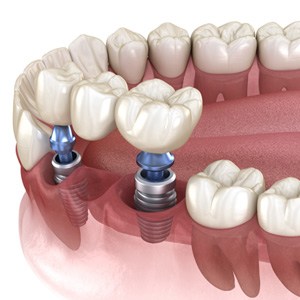
Dentures – Lincoln, NE
Improve Your Day-to-Day Life by Recreating Your Teeth
If you’ve lost most or all of your teeth, don’t worry; you’re not alone. About 40 million adults in the U.S. are missing all of their teeth, according to the American College of Prosthodontists. The impact of missing teeth can complicate simple tasks like speaking or eating. Not to mention, it can hinder your self-confidence. Here at South Ridge Dental, Dr. Ryan Shaffer and Dr. Steven Shaffer can vastly improve your day-to-day life by recreating your teeth with customized dentures. Contact our dental office today to find out if dentures in Lincoln, NE are right for you!
Why Choose South Ridge Dental for Dentures?
- Friendly, Down-to-Earth Dental Office Atmosphere
- Dentists with 30+ Years of Collective Experience
- State-of-the-Art Implant Dentures Available
Who’s a Good Candidate for Dentures?

Whether you’re missing just a handful of teeth or all of them, chances are you’re a good candidate for dentures. These prosthetics have been improving the lives of our patients for decades, offering full and beautiful smiles for better socialization and personal wellness. However, there are several criteria our team looks for when determining your candidacy. Read more below to see if you have all the qualities of a great denture candidate and then give us a call at South Ridge Dental to schedule your consultation!
Effects of Missing Teeth

Missing teeth can affect far more than just your appearance, they can have a profound effect on many aspects of your physical and mental health. Here are some of the detrimental effects of tooth loss:
- Poor Oral Health: The gaps left by missing teeth become food traps that can cultivate oral bacteria causing cavities and gum disease.
- Risk of Jaw Injury: Over time, your remaining teeth will shift to close the gaps in your smile. This leads to increased wear and risk of temporomandibular joint (TMJ) disorders.
- Reduced Confidence: Tooth loss can also take a psychological toll on you. It can evoke feelings of embarrassment and lower your self-esteem, especially if your facial structure or speech are affected.
What Are the Qualities of a Great Candidate for Dentures?

There are many factors our team looks at when considering dentures as a treatment option for our patients, including:
- Good Oral Health: Issues like cavities in your remaining teeth and gum disease must be treated before going forward with dentures to prevent irritation or infection.
- Sufficient Jawbone Density: Your dentures need to be supported by a healthy jawbone to be effective. Low bone density can lead to a poor fit and other issues.
- A Commitment to Treatment: Even if you don’t meet the criteria above, a willingness to take care of your oral health speaks volumes. As long as you’re committed, we can help you achieve your goals!
- A Need for Affordable Care: Dentures are one of the cheapest options when it comes to tooth replacement, so it’s perfect for patients on a tight budget.
Alternative Tooth-Replacement Options

Dentures aren’t your only option. In some cases, dental bridges or implants can fit your needs and goals better.
- Dental Bridges: These single-piece prosthetics slip over healthy teeth that have been shaped into anchor posts. Between each crown is a false tooth called a pontic. This can often be a good option for patients who still have healthy teeth and may only be missing one or two in a row.
- Dental Implants: The gold standard of tooth replacement, dental implants are titanium rods that are surgically placed into your jawbone. These fixtures serve as anchor points for crowns, bridges, and even dentures! They offer a permanent replacement solution with superior stability.
Types of Dentures

Thanks to the latest innovations in dental technology, today’s dentures appear more lifelike and fit more comfortably than ever before. Depending on your specific circumstances, your dentist in Lincoln will recommend one of the three types of dentures to complete your smile:
Partial Dentures
Also known simply as partials, partial dentures fill the gaps in your grin when you still have some teeth left. This prosthetic, consisting of a gum-colored base and custom-made artificial teeth, clasps behind your remaining teeth. Once your partial is in place, onlookers shouldn’t be able to tell which teeth are real and which are not!
Full Dentures
A full denture brings back an entire arch of lost teeth at the same time. Like partials, full dentures have a pink base and realistic teeth, but this prosthetic stays in place with natural suction against the gums, adhesive, or a combination of the two.
Implant Dentures
For a longer-lasting solution that won’t slip, we may suggest an implant denture. We can secure a full or partial denture onto a small number of dental implants that are surgically placed in the jawbone. Implant dentures restore more chewing power and feel more natural than traditional dentures.
How Dentures Are Made

Now that you understand more about the different types of dentures, you may find yourself wondering how they’re made. Many patients are surprised to learn that there’s a multi-step process involved which can take some time. This allows for a restoration that’s completely customized just for you, so it’s well worth the wait. Keep reading to learn more about how your artificial teeth will be created! If you have additional questions, feel free to contact us and we’d be happy to provide more information.
What Are Dentures Made Of?

Your dentures are made from two distinctly different components. To appear more lifelike, they include a base as well as artificial teeth. More details about each part are included below:
- Denture base: This is the foundational structure for your restoration that holds the pontics (artificial teeth) in place. It can be made from various materials like acrylic, nylon, porcelain, resin, or metal. Typically, full dentures are built with an acrylic base because it so closely resembles your gums. Partial sets usually also include metal clips that can be latched to your remaining teeth to stabilize them in your mouth.
- Pontics: These are generally made from either porcelain or a composite resin material. Both options can be color-matched to look more natural. In many cases, porcelain is preferred because of its resilience and durability. That said, sometimes it’s abrasive against your natural teeth so if you’re getting partial dentures, the pontics might be resin.
The Denture Creation Process

If you’re feeling impatient about the wait time before you receive your dentures, understanding the step-by-step process might help. A standard outline looks like this:
- Step 1: Your dentist makes an impression of your teeth and gums by having you bite down into a tray containing thick paste. This hardens and is used to create a plaster model of your mouth to ensure that your dentures are just the right size and shape.
- Step 2: This cast is sent to a dental laboratory to get to work. They begin by creating a wax version of your gums on the model.
- Step 3: Pontics made of acrylic or resin are placed into this wax with a device known as an articulator. Then, a technician will carve and shape the wax to appear more lifelike.
- Step 4: This wax version of your restoration is sent back to our office so we can schedule you for a fitting. If everything looks and feels as intended, it will be returned to the lab to be finalized. You may be given a temporary set of dentures at this point while waiting for your permanent ones to arrive.
- Step 5: Next, the wax needs to be removed. This is done back at the lab by placing your dentures into a flask and then pouring plaster in to retain their shape. The entire flask will then be placed in hot water to boil the wax away.
- Step 6: Holes are made in the synthetic teeth so the material being used (usually acrylic) can attach to it. A liquid separator is added to the plaster layer to prevent this from sticking to it when it’s removed. Then, the acrylic is injected into the flask to replace the now-absent wax.
- Step 7: The plaster is gently removed using specially designed tools to reveal the dentures. Once most of the plaster is gone, they’re placed in an ultrasonic bath to remove any that’s leftover.
- Step 8: Any excess acrylic is cut away and then your trimmed restoration is polished.
- Step 9: Finally, your dentures are delivered back to us for a final fitting. Any necessary adjustments can be made at that time to ensure that your artificial teeth fit and function properly.
Adjusting to Your New Dentures

It can take some time to get used to wearing your dentures, and you may experience a certain level of discomfort until you’ve adjusted. It can take about a month to grow accustomed to eating and speaking with them in your mouth, so try to be patient with yourself. It’s also normal to experience some tenderness in your gums until they’re less sensitive to having dentures pressed against them all day. To provide some comfortable during this period, you might want to stick to a diet of soft foods, so you don’t have to worry as much about chewing. You can also try denture adhesives which form a tighter bond as well as a layer of cushion for your mouth.
Benefits of Dentures

Whether you’re missing just a few teeth or one or both arches, navigating daily life without all of your pearly whites isn’t easy. Not only will you struggle to speak clearly and chew all of your favorite foods, but your confidence will also suffer. That’s why dentures don’t just replace missing teeth; they restore the quality of life that’s lost when your smile is incomplete. Keep reading below to learn more about some of the awesome benefits that dentures in Lincoln have to offer!
Psychological Benefits

It’s not uncommon for people who’ve experienced tooth loss to have trouble accepting their incomplete smile, and this can lead to their self-esteem plummeting. This can make navigating social situations and engaging in meaningful conversations much more difficult, which can lead to social anxiety, depression, or other types of psychological issues. However, patients who restore their teeth with dentures are almost certain to experience increased confidence and self-esteem.
Clearer Enunciation

Teeth do more than assist with eating – they also assist with speaking! Your lips and tongue rely on the position of your teeth to pronounce certain sounds and phrases, so if you’re missing teeth, you will likely struggle to enunciate everything clearly. Fortunately, dentures can help since they replace your teeth precisely in terms of shape and feel. That said, once you’ve adjusted to wearing your dentures, which normally takes about a month, you can expect to have an easier time speaking and conversing.
Improves Nutrition

Some healthy foods are tough and coarse in texture; for example, raw vegetables and fruits, lean proteins, and other similar items can sometimes be difficult to chew thoroughly, especially if you don’t have all of your teeth at your disposal. This can lead to all sorts of dietary issues, including indigestion, malnutrition, and the potential to choke. Thankfully, dentures allow for a more expansive diet that includes all sorts of healthy options since they fully restore your ability to bite and chew, and consuming these items will be easy!
Preserves Oral Health

No matter what the reason behind your tooth loss is, your oral health is at an increased risk of encountering various issues. For example, any remaining natural teeth are at risk of shifting towards the gap(s) and falling out themselves. Dentures can fill these gaps, no matter where they are, and ensure that your remaining teeth stay where they’re supposed to be. Dentures also reduce the amount of wear and tear on your remaining natural teeth, since they assist with eating.
Expands Opportunity

In today’s world, a gorgeous smile can take you places, and it’s very common for patients who restore their teeth with dentures to enjoy professional benefits and further career opportunities. Studies also show that the probability of being employed is closely linked with oral health; people with clean and healthy teeth and gums are more likely to succeed in job interviews, meetings, or presentations than those with gaps in their grins. This is reason enough to rebuild your smile with the help of dentures!
Understanding the Cost of Dentures

Dentures in Lincoln are one of the most cost-effective ways to address the loss of multiple teeth. Their price depends on a number of factors, so we will not be able to provide you with an accurate cost estimate until you visit us for your consultation. Our team will help you understand the financial aspects of your care and assist you as you explore payment options.
Factors that Affect the Cost of Dentures

Some of the biggest factors that influence the cost of dentures in Lincoln are:
- Preparatory procedures. Before getting dentures, some patients need to have their remaining natural teeth extracted or undergo gum disease therapy.
- The materials used. Dentures can be made out of various materials. For example, acrylic teeth may have a different price than porcelain ones. We strive to always use top-quality materials.
- The type of denture. Implant dentures tend to cost more than partial dentures or traditional full dentures.
Some dental offices may advertise “cheap” prices for dentures. Be wary of such offers — they might provide unsatisfactory results.
Are Implant Dentures More Expensive?

Implant dentures tend to cost significantly more because they require a complex treatment process, which may involve one or more surgeries. However, as an experienced denture dentist in Lincoln, we believe that implant dentures are worth the price! They offer a range of health and functional benefits that you cannot get from traditional tooth replacement. For example, they preserve the jawbone and will not slip around in the mouth. Plus, they can last for many years. In the long run, they may actually cost less than traditional dentures that need to be replaced every 5 – 8 years or so.
Does Dental Insurance Cover Dentures?

Most dental insurance plans do cover dentures. This treatment is usually classed as a “major procedure,” which means that 40 – 50% of its price is likely to be covered, up to the amount of your insurance plan’s annual maximum. Our dental office is in-network with several major insurance companies. We will be happy to verify your coverage and file claims on your behalf. Our goal is to help you use your policy to your greatest financial advantage.
Other Options for Making Dentures Affordable

In addition to helping you navigate your insurance, we offer a few provisions that may make dentures more affordable:
- We are partnered with CareCredit, a third-party lender that offers flexible payment plans. Many of their financing options come with little to no interest, and most patients’ credit scores are adequate to qualify for CareCredit.
- In-house membership plan. If you do not have insurance, ask about our membership plan. For a reasonable annual fee, you can enjoy all necessary preventive care and a significant discount on a wide range of other services.
Are you ready to learn more about dentures and their cost? Schedule a consultation with our friendly team today!
Dentures Aftercare

Dentures are a significant investment that restores your smile’s function and appearance, so it’s important to take excellent care of them so they can last for as long as possible. Even if you have few or no remaining natural teeth, it’s still crucial to visit our office in Lincoln so we can monitor your oral health and address any issues while they are in their early stages and screen for oral cancer. It can be very difficult for a person who wears dentures to notice oral health abnormalities on their own, and early detection is the best way to ensure that any issues are effectively addressed. Here’s a brief guide to proper denture care, but please contact our office if you have any questions.
Removable Dentures

Remove After Eating
After you finish a meal, remove your dentures and rinse them off to wash away plaque and food debris. Remember not to use hot water, as it can cause the bases of your dentures to warp and ruin the way they fit.
Clean Your Restoration
Dentures require daily maintenance to stay beautiful and functional. When you take your dentures out to clean them, gently brush them with a soft-bristled brush and a little bit of denture cleanser, mild dish soap, or unscented hand soap. Remember not to use regular toothpaste, as it is abrasive enough to leave visible scratches on the bases and artificial teeth of your dentures. If you’re not putting your dentures back in immediately, place them in a container with water or an approved denture-cleansing solution to keep them from drying out and losing their shape. Always thoroughly rinse your dentures before replacing them in your mouth, as denture-cleaning products are not meant to be swallowed.
Keep Your Dentures Safe
Before cleaning your dentures, fill your sink with lukewarm water and place folded towels across your countertop to create a cushion in case you drop them. It’s also a great idea to store them carefully out of the reach of pets and small children.
Remove Dentures When You Sleep
Since wearing dentures reduces circulation to your gums, it’s best to remove your appliance before bed so your mouth has ample time to rest and clean itself. Sleeping while wearing dentures is associated with irritation of soft tissues, pneumonia, and higher levels of gum and tongue plaque. Remember to soak your dentures in water or an approved denture-soaking solution overnight to prevent them from drying out and permanently losing their shape.
Notice Changes
Pay attention to the way your dentures look and feel so you can mention any changes to your dentist. Issues to look out for include mouth sores, gum irritation, or signs of infection. Never try to repair damaged dentures on your own, as you could damage them further. Instead, call our office so we can schedule some time to look at and tend to your appliance. If you notice signs of your dentures not fitting properly such as clicking or shifting, please let us know. We may need to reline your restoration so it fits properly or replace it altogether.
Dentures Frequently Asked Questions

Even if you’re positive that you want to rebuild your smile with dentures in Lincoln, chances are you have some questions that need answering beforehand. Below, you’ll find the answers to a few of the most common questions that our team gets asked about dentures. Of course, we’re also happy to provide you with any additional information you need when you visit us for a dentures consultation!
Can I Sleep in My Dentures?
When we first give you your denture, we’ll typically ask that you keep the prosthetic in your mouth for a full 24 hours. After that, though, it’s best to take your denture out before bed. After the pressure of supporting your denture all day, your gums and jaw need some time to recover. Removing your teeth at night presents the perfect opportunity.
Another reason to take your dentures out at night is to minimize bacterial growth. Bacteria thrive in dark, damp environments, making the space in between your denture and your gums very attractive to them. If you don’t remove and clean your dentures on a nightly basis, you’ll have a higher risk of bad breath, odorous dentures, and infections like gum disease and pneumonia. For that reason, let your dentures soak overnight in a cool or room-temperature container of denture cleaning solution.
Can I Use Regular Toothpaste to Clean My Dentures?
Just because dentures can’t develop cavities doesn’t mean you shouldn’t brush and rinse them every day. However, avoid using regular toothpaste to clean your dentures. Toothpaste is actually abrasive to dentures; it can leave tiny cracks in your prosthetic that can cause severe damage over time.
Instead, your denture dentist in Lincoln suggests cleaning your dentures with a soft-bristled toothbrush and mild liquid hand soap. Afterward, rinse off your prosthetic and brush your gums and tongue before inserting the denture back into your mouth. This will cut down on the buildup of plaque while also clearing away any lingering adhesive residue on your gums.
What Can’t You Eat with Dentures?
Dentures allow you to eat a much more varied diet than you can with missing teeth, but you should still exercise caution around certain foods. For example, sticky items like gummy candies and peanut butter could pull dentures out of place. Shelled nuts, popcorn, sunflower seeds, and other foods consisting of tiny pieces can not only be challenging to chew with dentures, but they can get trapped underneath your prosthetic and attract bacteria. Lastly, avoid placing excessive stress on your dentures by staying away from tough foods like steak, apples, and carrot sticks.
Should I Have All of My Teeth Pulled to Get Dentures?
As realistic and comfortable as modern tooth replacements are, nothing beats your home-grown pearly whites. That’s why our dentists will only recommend extracting a tooth when there are no viable options for repairing it. If you still have some healthy teeth remaining, we will typically suggest that you keep those teeth and opt for a partial denture instead of a full denture. Of course, we can go over your options during your consultation to select the best solution for your unique smile.